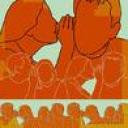Can You Catch Good Health Habits From Others?
 Habits spreading like infectious diseases through social networks appear to be all the rage. Catching your eating, smoking, happiness, mood and hygiene habits from those you hang out with is under the microscope. For a quick overview and some interesting reader comments (that challenge) check out Eva Judson’s post in the New York Times on Social Medicine. Please note that is social (as via social networks) not socialized (as via single payer government system) medicine.
Habits spreading like infectious diseases through social networks appear to be all the rage. Catching your eating, smoking, happiness, mood and hygiene habits from those you hang out with is under the microscope. For a quick overview and some interesting reader comments (that challenge) check out Eva Judson’s post in the New York Times on Social Medicine. Please note that is social (as via social networks) not socialized (as via single payer government system) medicine.
I have read the literature around this topic for some time in the hopes of gaining new scientific insight into how we form (or fail to form) habits. The key question from a cognitive design standpoint is what is the social cognitive psychology behind behavioral contagions? The answer unfortunately, is not clear.
”But then, how does something like obesity get “caught”? That’s not clear. One idea is that people judge their own weight by that of their friends — you think of yourself as thin if you are thinner than the people you know — and eat accordingly. Another is that friends mirror one another’s eating habits. Many studies have found that people tend to eat less when they are eating with someone who is not eating much. Also, people tend to eat more when they eat with friends rather than with strangers. Perhaps, too, a habit of eating, say, dessert when you are with your friends makes you more likely to eat it when you are alone. ”
Perhaps there is a mystery here because we are not looking at the entire picture.
Clearly how I behave is shaped by context – the environment and the people I am with but it also shaped by internal mental forces most notably my capacity for self-regulation. I wonder if the underlying cause and effect could be reversed. Perhaps I hang out with people who “are like me” when it comes to emotional and behavioral self control. After all obesity for some involves eating in secrete which is hardly a social network effect.
On the other hand it may be a lack of self-regulatory capacity or a specific kind of self-regulatory capacity that opens behavior patterns up to social network effects. After all we use the idea of “support groups” (e.g. weight watchers) to effectively reshape behaviors but these are not naturally occurring social networks.
Unlike the idea virus or viral video which has had important general lessons for the cognitive designer, the idea of a behavioral virus, at least as far as I can tell, has yet to yield designable insights. Perhaps that is because there is no such thing.